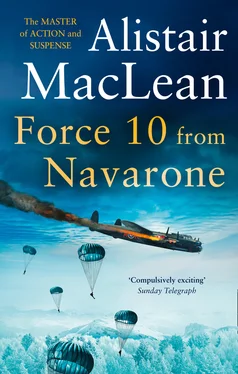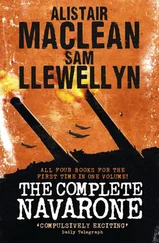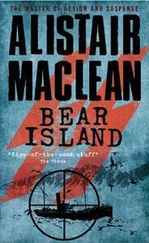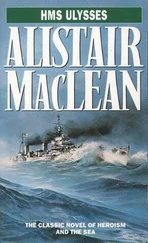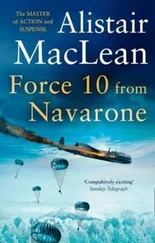‘Fifteen thousand canvas horses?’
‘Very, very amusing.’ Jensen rapped the map again. ‘Every airfield between here and Bari is jammed with dummy bombers and gliders. Outside Foggia is the biggest military encampment in Italy – occupied by two hundred men. The harbours of Bari and Taranto are crowded with assault landing craft, the whole lot made of plywood. All day long columns of trucks and tanks converge on the Adriatic coast. If you, Mallory, were in the German High Command, what would you make of this?’
‘I’d suspect an airborne and sea invasion of Yugoslavia. But I wouldn’t be sure.’
‘The German reaction exactly,’ Jensen said with some satisfaction. ‘They’re badly worried, worried to the extent that they have already transferred two divisions from Italy to Yugoslavia to meet the threat.’
‘But they’re not certain?’
‘Not quite. But almost.’ Jensen cleared his throat. ‘You see, our four captured mission leaders were all carrying unmistakable evidence pointing to an invasion of Central Yugoslavia in early May.’
‘They carried evidence –’ Mallory broke off, looked at Jensen for a long and speculative moment, then went on quietly: ‘And how did the Germans manage to capture them all?’
‘We told them they were coming.’
‘You did what!’
‘Volunteers all, volunteers all,’ Jensen said quickly. There were, apparently, some of the harsher realities of total war that even he didn’t care to dwell on too long. ‘And it will be your job, my boy, to turn near-conviction into absolute certainty.’ Seemingly oblivious of the fact that Mallory was regarding him with a marked lack of enthusiasm, he wheeled round dramatically and stabbed his cane at a large-scale map of Central Yugoslavia.
‘The valley of the Neretva,’ Jensen said. ‘The vital sector of the main north-south route through Yugoslavia. Whoever controls this valley controls Yugoslavia – and no one knows this better than the Germans. If the blow falls, they know it must fall here. They are fully aware that an invasion of Yugoslavia is on the cards, they are terrified of a link-up between the Allies and the Russians advancing from the east and they know that any such link-up must be along this valley. They already have two armoured divisions along the Neretva, two divisions that, in the event of invasion, could be wiped out in a night. From the north – here – they are trying to force their way south to the Neretva with a whole army corps – but the only way is through the Zenica Cage here. And Vukalovic and his seven thousand men block the way.’
‘Vukalovic knows about this?’ Mallory asked. ‘About what you really have in mind, I mean?’
‘Yes. And the Partisan command. They know the risks, the odds against them. They accept them.’
‘Photographs?’ Mallory asked.
‘Here.’ Jensen pulled some photographs from a desk drawer, selected one and smoothed it out on the table. ‘This is the Zenica Cage. Well named: a perfect cage, a perfect trap. To the north and west, impassable mountains. To the east, the Neretva dam and the Neretva gorge. To the south, the Neretva river. To the north of the cage here, at the Zenica gap, the German 11th Army Corps is trying to break through. To the west here – they call it the West Gap – more units of the 11th trying to do the same. And to the south here, over the river and hidden in the trees, two armoured divisions under a General Zimmermann.’
‘And this?’ Mallory pointed to a thin black line spanning the river just north of the two armoured divisions.
‘That,’ Jensen said thoughtfully, ‘is the bridge at Neretva.’
Close-up, the bridge at Neretva looked vastly more impressive than it had done in the large-scale photograph: it was a massively cantilevered structure in solid steel, with a black asphalt roadway laid on top. Below the bridge rushed the swiftly-flowing Neretva, greenish-white in colour and swollen with melting snow. To the south there was a narrow strip of green meadowland bordering the river and, to the south of this again, a dark and towering pine forest began. In the safe concealment of the forest’s gloomy depths, General Zimmermann’s two armoured divisions crouched waiting.
Parked close to the edge of the wood was the divisional command radio truck, a bulky and very long vehicle so beautifully camouflaged as to be invisible at more than twenty paces.
General Zimmermann and his ADC, Captain Warburg, were at that moment inside the truck. Their mood appeared to match the permanent twilight of the woods. Zimmermann had one of those high-foreheaded, lean and aquiline and intelligent faces which so rarely betray any emotion, but there was no lack of emotion now, no lack of anxiety and impatience as he removed his cap and ran his hand through his thinning grey hair. He said to the radio operator seated behind the big transceiver:
‘No word yet? Nothing?’
‘Nothing, sir.’
‘You are in constant touch with Captain Neufeld’s camp?’
‘Every minute, sir.’
‘And his operator is keeping a continuous radio watch?’
‘All the time, sir. Nothing. Just nothing.’
Zimmermann turned and descended the steps, followed by Warburg. He walked, head down, until he was out of earshot of the truck, then said: ‘Damn it! Damn it! God damn it all!’
‘You’re as sure as that, sir.’ Warburg was tall, good-looking, flaxen-haired and thirty, and his face at the moment reflected a nice balance of apprehension and unhappiness. ‘That they’re coming?’
‘It’s in my bones, my boy. One way or another it’s coming, coming for all of us.’
‘You can’t be sure , sir,’ Warburg protested.
‘True enough.’ Zimmermann sighed. ‘I can’t be sure. But I’m sure of this. If they do come, if the 11th Army Group can’t break through from the north, if we can’t wipe out those damned Partisans in the Zenica Cage –’
Warburg waited for him to continue, but Zimmermann seemed lost in reverie. Apparently apropos of nothing, Warburg said: ‘I’d like to see Germany again, sir. Just once more.’
‘Wouldn’t we all, my boy, wouldn’t we all.’ Zimmermann walked slowly to the edge of the wood and stopped. For a long time he gazed out over the bridge at Neretva. Then he shook his head, turned and was almost at once lost to sight in the dark depths of the forest.
The pine fire in the great fireplace in the drawing-room in Termoli was burning low. Jensen threw on some more logs, straightened, poured two drinks and handed one to Mallory.
Jensen said: ‘Well?’
‘That’s the plan?’ No hint of his incredulity, of his near-despair, showed in Mallory’s impassive face. ‘That’s all of the plan?’
‘Yes.’
‘Your health.’ Mallory paused. ‘And mine.’ After an even longer pause he said reflectively: ‘It should be interesting to watch Dusty Miller’s reactions when he hears this little lot this evening.’
As Mallory had said, Miller’s reactions were interesting, even if wholly predictable. Some six hours later, clad now, like Mallory and Andrea, in British Army uniform, Miller listened in visibly growing horror as Jensen outlined what he considered should be their proposed course of action in the next twenty-four hours or so. When he had finished, Jensen looked directly at Miller and said: ‘Well? Feasible?’
‘Feasible?’ Miller was aghast. ‘It’s suicidal!’
‘Andrea?’
‘Andrea shrugged, lifted his hands palms upwards and said nothing.
Jensen nodded and said: ‘I’m sorry, but I’m fresh out of options. We’d better go. The others are waiting at the airstrip.’
Andrea and Miller left the room, began to walk down the long passageway. Mallory hesitated in the doorway, momentarily blocking it, then turned to face Jensen who was watching him with a surprised lift of the eyebrows.
Читать дальше
